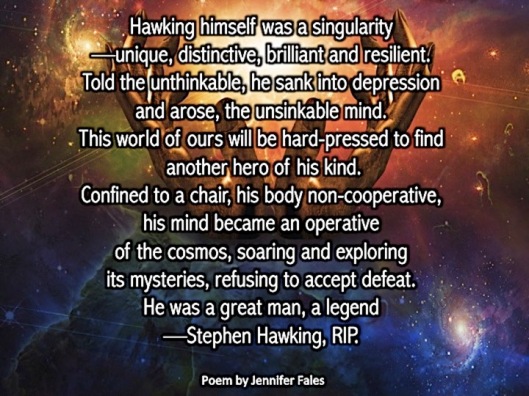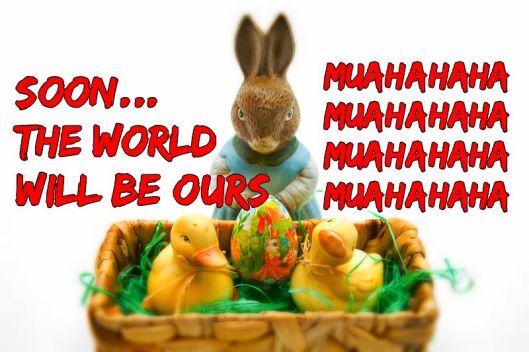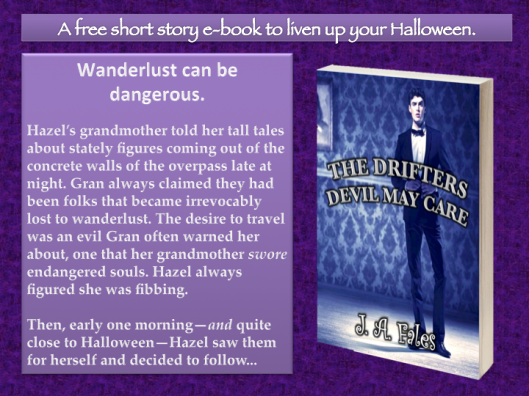Tags
Geek, Hero, inspiration, Observations, Physics, RIP, Science, Stephen Hawking, Tribute

Posted by perhapslucidity | Filed under Blogging, Jennifer Fales, Poetry, RIP Stephen Hawking, Uncategorized, Writing
14 Wednesday Mar 2018
Tags
Geek, Hero, inspiration, Observations, Physics, RIP, Science, Stephen Hawking, Tribute

Posted by perhapslucidity | Filed under Blogging, Jennifer Fales, Poetry, RIP Stephen Hawking, Uncategorized, Writing
28 Wednesday Dec 2016
Posted in Dark Comedy, Fiction, Horror, Humor, Insight, Introspection, life, Satire, The Holidays, travel, Uncategorized, Writing
Tags
airplanes, dark humor, flying, Fun, Holidays, life, Observations, Pet peeves, Purgatory, Rant, Southwest Airlines, Stephen King, Transit, travel, Writing
Lines penned on a Southwest flight, coming home, after reading Stephen King.

Purgatory is a claustrophobic flight in a thin blue-and-gray airline seat.
It’s an open window shade revealing nothing but gaping darkness, while the groggy, fat-bottomed woman ahead consistently rocks and teeters backward, aggressively infringing on that last inch of your sacred space.
Purgatory is Vegas-bound old women bellowing in jarring tones, discussing the mysteries of the universe with a harsh, nasal dissonance that someone somewhere surely must find beautiful. Not you, though—those staccato syllables ricochet and bounce off your nerve-endings like a hard rubber ball on a patch of close-minded concrete.
Purgatory is babies with inner ear issues crying, and children shrieking in a chorus, their caterwauling pelting your eardrums while the stench of recycled Italian food—garlic, butter, and over-seasoned meat—fresh from the nearby puckered anus of a mustached walrus envelopes you. It rises to kiss the ceiling, and the scent slips crafty fingers in the ventilation shafts so it can circle and repeat like some stinky, mischievous snake hell-bent on eating its tail.
Purgatory is an apathetic stewardess, the kind whose eyes are wise beneath the snazzy uniform and patent smiles. This person knows all, sees into your soul—this person recognizes you for the needy, whining shit you are.
Purgatory is a perpetually occupied lavatory after three rounds of drinks in shiny plastic cups, and a pilot who sings songs of turbulence in C Minor.
Purgatory is never reaching home.
Written Content Copyright© 2016 by Jennifer Fales
18 Friday Nov 2016
Posted in The Holidays, Uncategorized
Tags
Entertainment, Fun, inspiration, Internet, life, music, news, The Holidays, travel
As far as years go, there’s no denying that 2016 has been a real humdinger.
A good friend recently told me that she felt like she’d experienced more ups and downs than a yo-yo on an elevator and was just praying she’d make it to Christmas with her sanity intact.
We can all relate, right?
Seriously. Here are just a few of the things on our extensive list of 2016 peaks and valleys, and this list barely scratches the surface:
So, with all of that behind us—and thankfully so—it’s the time of year where we all pack up our emotional baggage, slap on our 2016 travel sticker as a memento, and move on to the Holidays.
Ah, yes, the Holidays (woohoo)!
From the end of October through December, you start to notice all the signs that the Holiday season is here once again. With it comes a wealth of opportunities to stoke the creative fires that dwindled or burned out under the weight of the year’s stressors, responsibilities, etc.
From the silly to the sentimental, here’s my Top Ten List of Things About The 2016 Holiday Season That Uplift And Inspire Us:
And don’t forget to spread the love by sharing all the things that uplift and inspire you with others this Holiday season!
17 Thursday Nov 2016
Posted in Uncategorized
We all have that one friend who is an avid reader and a bit of a grammar fiend, right? He or she is the one prone to point out (while skimming through an e-book) things like this:
Do you pay attention to them or roll your eyes and get on with your life?
If you’re a self-published author or a writer who is not an English major submitting any portion of your manuscript in the hopes an agent or publisher will want to read more, the answer is more important than you think.
Before I go any further, let me acknowledge something. Yes, there are talented copy editors out there, and you can pay one (if you wish and your budget allows), but that’s not the purpose of this blog post. It’s about being better equipped for success on your own. Not so coincidentally, that’s also the cheaper route.
You will notice there are links in the grammar fiend statements above that take you to resources, including grammarly.com, which is a favorite of mine for editing. I also love grammarbook.com for general rules of punctuation, grammar, and syntax—when in doubt, check it out.
Now, for grammar fiend illustrative purposes, I’ve written a before (A) and after (B) sample below. I want you to picture an agent picking them up from their slush pile or a person who paid for an e-book reading one vs. the other:
A) “Dot! Come take a look at this.”
Paul’s voice bounced off of the rust, and wreckage of old vehicles in the corridor. It soared high to rattle the rest of the broken skyscrapers still towering like the skeletons of dinosaurs above them.
“Your yelling,” Dot hissed at her brother. She was worried he was going to bring what was left of the world crashing down on them.
“Fine,” he replied in a stage whisper, running his hand through a patch off wavy, jet black hair. It was still streaked brown with dirt from crawling through tunnels and ditches to check there rattraps earlier in the morning. “Now, come and see this.”
B) “Dot,” Paul shouted. “Take a look at this!”
His voice bounced off the rust and wreckage of antique vehicles in the corridor. The sound soared, rattling the broken skyscrapers that towered like dinosaur skeletons above them.
“You’re yelling,” Dot hissed, worried the remnants of the world might come crashing down on them.
“Fine,” he stage-whispered, running a hand through his jet-black hair. It was streaked with dirt from crawling through tunnels and ditches to check their rat traps earlier that morning. “Come and see.”
Is B easier to read than A?
Does it look more professional to you?
Are you starting to think that fewer words can convey more meaning and see some of the silly little mistakes (like missing dialogue tags) we often overlook as writers?
Does what you see here make you think about taking a second look at something you’ve written?
Note: If you’re not certain why something was changed or want to learn more, I encourage you not just to ask me but use resources like Grammarly, Grammar Book, and copy editing blogs for tips. When in doubt, never shy away from Googling your question (like “Should I use off of or off?”) to find the right answer.
Your writing is your creative baby, right? You’ve spent so much time giving birth to it, already. Why risk it dying in a slush pile or the hands of a potential reviewer because of preventable errors?
Next time you sit down to write or edit that manuscript, remember that there are free resources out there to help you—and they’re only a question away.
15 Tuesday Nov 2016
Posted in Grammar, Insight, Self Publishing Advice, Self-Marketing Savvy, Uncategorized, Writing
Tags
Commentary, inspiration, Learning, Market Yourself, Marketing, self-promotion, Self-published authors, Writing
If you’ve had any involvement with marketing or sales, you’ve probably heard the term WIFM before. If not, that’s okay. It will be easy for you to remember going forward because it’s based on a principle of which, no matter how giving and selfless you may be, your subconscious is already very familiar.
So, what is WIFM?
WIFM is an acronym for What’s In it For Me.
It’s the cardinal assumption you should always work with when you’re developing a tagline or a pitch for anything. People need to know what’s in it for them—what the value of this thing you’re talking about is and how it is new, different, better, fulfilling, etc.
Now, let me ask you something:
Are you a fiction writer, aspiring or otherwise?
Yes?
Great. How do you sell talents? In other words, when people ask you—or you talk about—that book/story you’re working on, what do you tell them?
Think about what you typically say about your work and then ask yourself one simple question:
Have I said something that intrigues them and defines a benefit of choosing my work over other options in 3 or 4 brief sentences (roughly a paragraph)?
Here are some things to consider:
Here’s an example of some information you should be prepared to provide anyone who asks in a brief paragraph/ statement about your work—and, yes, I encourage you to draft one and revisit and revise it from time to time.
You believe in your work, after all—now, it’s time to make others do the same. Don’t be afraid to market yourself.
Lastly, mind your descriptors and don’t be afraid to Google synonyms and even pay attention to any ad campaigns you’ve seen that made a lasting impression. As silly as it sounds, ads for other (non-book) things may still help you find those words that stand out and excite people more than others. At the very least, it’ll start those creative gears churning in your head.
Here are some examples of weak vs. stronger vocabulary:
Note: Do not go overboard with unnecessarily grandiloquent terminology in your discourse. (See what I did there?) People will most likely be of the opinion that you are a pompous ass trying to impress them with big words. They may also wonder if you actually know the meaning(s).
14 Monday Nov 2016
Posted in Author, Insight, Uncategorized, Writing
Friends, Citizens, and Indie Authors—the holidays are upon us! Black Friday is right around the corner, soon to be followed by Santa and reindeer. Those cheery Christmas songs and Holiday ads are already popping up online and at that shopping mall around the corner. And, unfortunately, for most Independent Authors, it’s visions of finances—not sugarplums—that dance in our heads.
So, you’re an author, or you want to be one.
You have a story you’re dying to share with the world, right? You’re probably thinking e-book because there are no printing costs and everybody owns an e-reader these days. But you also possess a list of unavoidable things already tying up your purse strings or wallet this time of year:
You may be one of those people who, like I once did, believes you have to pay a service for e-book conversion to get it on sites like Amazon, Barnes and Noble, etc. Trust me, you’re not alone—folks are making income off that misconception. Google the topic (e-book conversion) and I guarantee that you’ll find online services happy to charge you anywhere from $49 to $300 or so just to convert your novel into ebook format for you.
Repeat after me: “Aww. That’s so sweet of you, random service. Thanks for taking my hard-earned money.”
If you are in the ranks of the group above, I’ve got some potentially good news for you—you can stop saying thank you.
Ever heard of Calibre e-book management? Here’s how it defines itself:
“Calibre is a free and open source e-book library management application developed by users of e-books for users of e-books. It has a cornucopia of features divided into the following main categories:
You noticed the second bullet point, right?
E-book conversion!!!!!!!!
It is a free downloadable application—you can also make a donation of whatever you can afford (a few bucks is a nice gesture, for the record). It also converts to a broad range of formats for you, though I only mention a few here.
It took me a little time playing around with it, at first, because I’m the dummy who likes to skim through online tutorials rather than reading them. I eventually decided on what I like (at the moment) for my pre-conversion Microsoft Word .docx settings.
As for document specs:
I have found that a regular 8.5 x 11 .docx (but not .doc—for some reason, the software can’t convert it) document with margins formatted for 1″top, 1″ bottom, 1.25″ left, 1.25″ right, 0″ gutter, 0.5″ header, 0.5″ footer works pretty well. (See the example below) when I convert to .mobi (Kindle) and .epub (Nook & iBooks) in Calibre:
DOCUMENT MARGINS
I also tend to prefer wider spacing for paragraphs, so I mostly use 8-10 pt spacing before and after and 1.5 line spacing (see the example below) for shorter works, but that is by no means the only way to go.
PARAGRAPH (Indents & Spacing)
Note: What you see in the snapshots above are my preferences, not necessarily yours. I encourage you to check out NookPress, KDP Amazon, or even Google formatting e-books or formatting margins for .mobi, epub, etc. in ___(whatever program you use—Word, etc.) and see what you get.
I also find it helps if you have an epub or Mobi compatible device. Since the conversion is instant, you can then open it in your reader (w/Amazon Kinde, you may have to email it to the email associated w/ your Kindle device and open it as a “Doc.”) and check it out for yourself.
Huge benefits of converting yourself:
Note: This blog post is just for fun and is meant to share my personal experiences and opinion in the writing arena. It is not intended as specific advice (take it or leave it as you like), and I have received no compensation—monetary or otherwise—from Calibre in return for this post. To the best of my knowledge, they have no idea I even exist, and they’re probably not the only free conversion service app out there, so feel free to do your homework and compare.
08 Tuesday Nov 2016
21 Friday Oct 2016
Posted in Barnes&Noble, Jennifer Fales, news, Satire, Twitter, Uncategorized
Tags
BarnesandNoble, Free ebook, Halloween, Humor, Netflix, news, NookBooks, Shenanigans, Spotify, Twitter, Twittermagedon
So, if you haven’t heard yet, which means you probably live under a rock (which might even be close to MY rock), the East Coast server responsible for the Twitterverse, Netflix, Spotify, etc was attacked today. Apparently, repeatedly.
While I do not condone such shenanigans, I felt what will most certainly be a COMPLETELY inaccurate depiction of the perps was called for:

…May your Blog Kung Fu be strong today, kiddos.
P.S. This is a fun, free Halloween read:
17 Monday Oct 2016
Posted in Humor, Mondays, Poetry, Satire, Uncategorized
I think that I shall never spy.
A poem lovely as a Sunday night.
Then Monday comes along to test.
The good intentions in my head.
Got a list of things to do today.
But all I can think to do is pray…
For the patience not to kill these folks.
Calm down. It was only (sort of) a joke.
Seriously.
It’s not like I’m totally crazed.
(I’ve got too much to do today.)
I suppose that I should just be grateful.
It’s only Mondays that feel this hateful.
16 Sunday Oct 2016
Posted in Barnes&Noble, Books, Fantasy, Fiction, Halloween, Jennifer Fales, Short story, Uncategorized, Writing
Tags
Angels, Devil, Devil May Care, Drifters, e-books, free, Fun, God, Halloween, Lucifer, Mythology, Papa Legba, travel, Voodoo, Wanderlust
“Nothing behind me, everything ahead of me, as is ever so on the road.”
-Jack Kerouac, On The Road
This is a sample from the first chapter of the short story I released for Halloween. It’s a fun free read w/a tip of the hat to Voodoo via a fallen Seraph who dated Papa Legba and a slightly twisted look at the traditional forces of good & evil—God and Lucifer. Lucifer’s half-human son Deverell is featured on the cover. The e-book is available for free download on All Romance Ebooks (PDF, ePub, Mobi), iBooks, and NookBook.
Written content Copyright ©2016 Jennifer Fales All Rights Reserved
When Ada Marcus was alive, she told people that she sometimes saw two stately figures coming from the smog-stained walls of the overpass at night. Most of them just called her crazy. The fact she was awake at that hour was no wonder—regardless of earmuffs and box fans, the grand old dame never managed to sleep well once the cars started rolling through.
The woman didn’t know what she even saw, at first. They weren’t people, exactly—they were more and less than that, ominous beings consumed by extraordinary wanderlust. She was never sure if they were dead or alive but figured, since they seemed inordinately restless, that it was somewhere in between. Eventually, she came up with a name for them.
Those dirty Drifters.
Of course, there was only one person, her granddaughter Hazel, who knew the senior citizen well enough not to think she was crazy. Hazel figured she was fibbing—telling cautionary tales out of desperation. She knew Ada wanted her discontented little Hazel to settle down with a local boy across town just as she had done, not restlessly dive into the gaping maw of a great big, boundless world.
The legend of the Drifters disappeared after Ada died, becoming one more forgotten bedtime story. Right up until the eve of her twenty-first birthday, quite close to Halloween, when Hazel’s mother somewhat impolitely asked her to clean Ada’s sprawling Victorian. Her mom had decided to keep the place as a rental property, and the most recent tenants, who were seemingly reliable with decent credit scores, had flown the coop two days prior. The poor little doves thought the neighborhood too dicey and loud for an upwardly mobile young couple—all in all, not surprising.
It probably was.
As for Hazel, she saw something that surprised her. It was right at a quarter to one, just as she was cleaning several fingerprint smudges from one side of the glass in the canted bay window overlooking the street. Two individuals—a pale young man, in a black suit and tie, with and an elegant dark-skinned woman in a white dress and matching silk headscarf—stepped out of a dirty concrete wall together. They did it as if it were nothing unusual and strolled across the intersection, heading in the direction of the house.
Hazel immediately recognized them as Drifters, and Gran had been partially right about them. They were strange, yes, with an air of magic, but they looked nice, not filthy, and she didn’t think they meant any harm. Not after the male made eye contact with her. Something about the look they shared suggested he knew her. Although that seemed impossible, her body still tingled at the thought, from the top of her tumbledown chestnut hair all the way down to her toes.
Being an adventurous soul, she took his glance as permission to follow. Grabbing her green velvet jacket and worn brown boots—despite the fact Gran would have said don’t do it had she still been around—Hazel reset the alarm and locked the front door. Confident all was well with the house, she shoved its old brass key in her pocket, slipping down the steps and onto the sidewalk behind them…